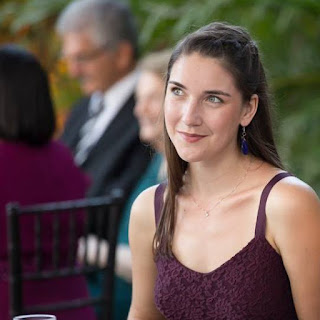 |
| Devon Brown, MSW/MPH student (Dec '18) |
Most people do not consider
themselves to be single-track or unidimensional people, yet we’re instructed to
build our career paths around one profession. When we’re little and asked the stereotypical
question, “what do you want to be when you grow up?”, very few of us name one
job and stick with it through our lives. For example, I vividly remember
wanting to be a veterinarian, an archeologist, a fashion journalist, an art
historian, and a psychologist. I never did figure out a way to combine all of
those careers. In fact, I did not realize until I started hearing the term dual
degree, that I could actually pursue an advanced degree in more than one field
at a time. I suppose what I did not realize until very recently was that I
wanted to be a dual professional – somebody with a knowledge base and skill set
that bridge two professional fields, typically fostering a more creative,
comprehensive, and communicative work style.
My pending
role as a public health social worker encapsulates the dynamic benefits and
challenges of being simultaneously trained in more than one professional arena.
Both fields share an emphasis on social justice, addressing the social
determinants of health, and tending to both the environmental and personal
factors related to health outcomes. As so succinctly defined by Kate Jackson,
public health social work “stresses a socio-epidemiological approach to the
prevention and management of health issues” (Jackson, 2015). Health status
exists as a byproduct of socioeconomic status, environmental factors, and pre-existing
personal biology. The dual nature of being trained as an MSW and MPH translates
to an ability to assess a physical or mental health situation as something
beyond a singular moment or cause. We understand both that prevention begins
before the onset of a palpable problem, and that treatment must extend beyond
the problematic situation at hand. Public health social workers also recognize
that there are usually a number of barriers faced by individuals and
communities in trying to implement preventive and treatment measures, focusing
much of our work on addressing these various blockades through direct and
program-level approaches. We have the opportunity to show people their own
personal power while we concurrently work to address the external factors that
may have previously hidden their inner superhuman from themselves. Our
interdisciplinary training as dual degree students teaches us to approach
problems with the clarity that more than one perspective must be taken in order
to establish a more robust understanding and develop an optimal solution
(Repko, 2014).
While a key
difference between social work and public health surfaces in the occasional
contradiction of client self-determination and population health risk, the dual
emphasis on “the dignity and worth of the individual and the importance of
human relationships” provides a compass for ultimate decision making (Jurkowski & Keefe, 2013). Certainly, the ethical friction
between individual health and population health will always be an issue, but
I’ve learned that the provision of our expertise as public health social
workers can soften the potential clash and help us to establish a compromise.
We have the knowledge and skills necessary to facilitate positive communication
across several professional levels, and we take this role very seriously in all
parts of our lives. My experience with fellow public health social workers continues
to illustrate the personal embodiment of our professional ethics, competencies,
and standards. I feel deeply grateful to so often find myself surrounded by
people who value the potential in all people and who carry a daily passion for
equity and advocacy.
Perhaps my
interdisciplinary role as a public health social worker is actually the perfect
blend of my little-girl grown-up career goals because in this profession I get
to offer support to those in need, constantly learn about and appreciate different
cultures, engage with a rainbow of people, study the more scientific aspects of
health and wellbeing, and work to bring beauty into people’s lives.
- Devon Brown, expected
graduation December 2018
Visit Devon's LinkedIn Profile.
References
Jackson, K. (2015). Public health social work: Now more than ever. Social Work Today, 15(6), 12.
Jurkowski,
E. T., & Keefe, R. H. (2013). Handbook
for public health social work. New York: Springer Publishing Company.
Repko, A. F., Szostak, R., Buchberger, M. P. (2014). The interdisciplinary studies “Cognitive toolkit.” In Introduction to interdisciplinary studies (pp. 49-61). Los
Angeles, CA: SAGE.



